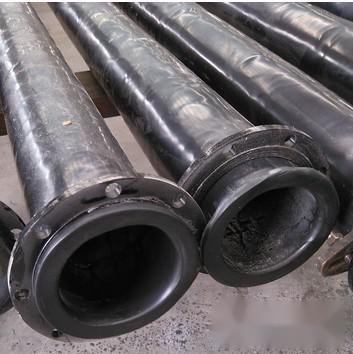Main characteristics of mineral powder transportation pipelines:
1. The mineral powder transportation pipelines use ultra-high molecular weight polyethylene pipes, which have a molecular weight exceeding 2.5 million and a low wear index, giving them extremely high resistance to sliding friction. Their wear resistance is 6.6 times greater than that of ordinary alloy steel and 27.3 times greater than that of stainless steel. It is also 17.9 times that of phenolic resin, significantly extending the service life of the pipelines.
2. Extremely high impact resistance. Among existing engineering plastics, the impact toughness value of tailings pipes is high. Many materials may crack, break, shatter, or suffer from surface stress fatigue under severe or repeated impacts.
3. Corrosion resistance. The mineral powder transportation pipeline features a saturated molecular structure, which can withstand the corrosion of aggressive chemicals. It only has slight corrosion against certain strong acids at high temperatures, while remaining unaffected by other alkaline or acidic solutions.
4. Resistance to scaling. Due to its low friction coefficient and non-polar nature, the mineral powder transportation pipeline exhibits excellent surface non-adhesiveness and high smoothness. This product does not scale, a characteristic that is of great significance for the ash discharge system in thermal power plants.
5. Easy installation. The unit weight of the mineral powder transportation pipeline is only one-eighth that of steel pipes, making it suitable for both above-ground and underground installation. The installation can be done through welding or flange connections, ensuring safety, reliability, speed, and ease, without the need for corrosion protection, thus highlighting the advantages of using ultra-high molecular weight polyethylene pipelines as "energy-saving, environmentally friendly, economical, and efficient."
Application of mineral powder transportation pipelines in industry:
Coal mines, chemical minerals, iron ore, non-ferrous metal mines, and non-metallic mines commonly use pipelines for transporting slurries in beneficiation plants, such as raw ore pipes, tailings pipes, concentrate pipes, and flotation system pipes. According to statistics from Japan, the service life of concentrate pipes used for transporting slurries is 15,000 hours, with raw tailings pipes lasting as short as 6,000 hours, and slurry filling pipes averaging 6,000 hours, with longer durations being 1,000 hours. Currently, most pipelines for transporting tailings and concentrates in China's beneficiation plants are steel pipes. Due to the presence of about 30% iron ore in the slurry, wear on the steel pipes is quite severe, resulting in a service life of only 1 to 2 years, with a need for a 90° rotation every six months, leading to a significant workload.
Simple production process for mineral powder transportation pipelines: Mixing — Heating Extrusion — Cutting — Assembly — Finished Product — Warehouse
Sales Manager: Zhang Yang 13526921028
Technical Consultation Phone: 0379-63225792
Fax: 0379-63225792
Factory Location: Luoyang Airport Industrial Park, China













